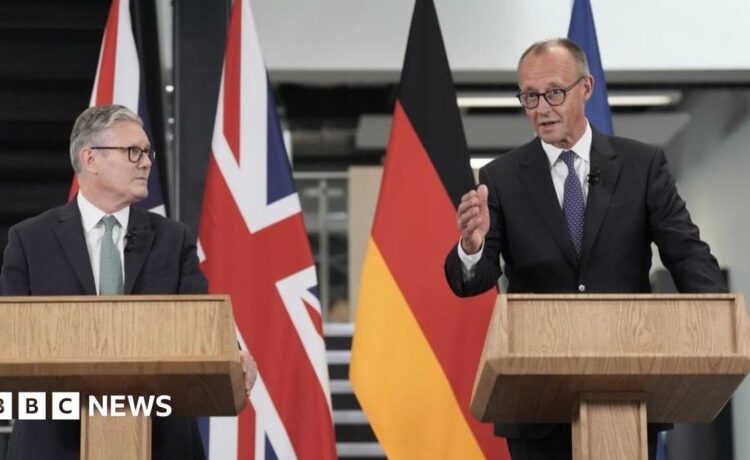
Treaty sends important signals about shared prioritiespublished at 16:25 British Summer Time
 Damian Grammaticas
Damian Grammaticas
Political correspondent
Flying around are a lot of big claims that what’s been agreed in today’s treaty is “historic” and “ground-breaking”, hyperbole aside does it live up to that?
Well, in the broadest brush sense, yes. As the German chancellor noted, it’s the first such treaty the UK and Germany have signed since they fought in the Second World War.
In truth some of the things the two sides are highlighting aren’t exactly new. The pledge to defend each other in case of an attack is already a Nato commitment.
Other things that aren’t new are that Germany will change its laws to make it easier to seize boats for use by people-smugglers in the Channel, which was agreed before today – and through its deal earlier this year with the EU, the UK had already secured a commitment that countries would open more e-gates to British travellers.
But there are specific areas where the treaty has practical consequences, joint defence projects, a push to try to increase exports to third countries of jointly-produced weapons such as fighter jets and armoured vehicles, and joint green energy projects in the North Sea.
And more important is the fact the treaty sets in place a whole system of annual meetings of ministers and officials, in defence, security, finance, home affairs, investment and more to co-ordinate policies. On top of that the leaders will meet every two years to set out an action plan.
That sounds like dry stuff, but it sends important signals through government structures and business about the shared priorities and shared intent here.
Of course there was far deeper and more structured co-operation when the UK was a member of the EU. In that sense this treaty isn’t historic. But it is building new forms of co-operation and the processes to make that work.




